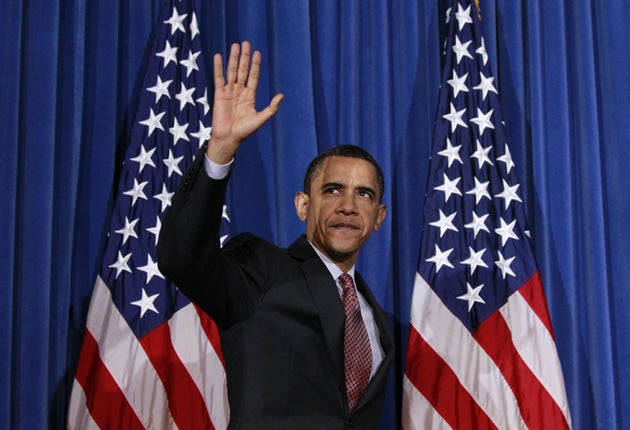Rupert Cornwell: The 'Obama effect' is real – except at home
World Focus

A prophet is not without honour, said Jesus, save in his own country. Now, even the most passionate supporters of Barack Obama would not liken him to the Son of God. But how else to interpret the seemingly contradictory findings of two polls released yesterday?
One, conducted on behalf of the BBC World Service, suggests that people around the world are warming again to the US, under its new leader. The other, by the Pew Research Center in Washington DC, shows Americans more down on their own government than at almost any time in the last half century.
The improved global opinion of the US, as evidenced by the BBC's poll carried out in 28 countries, was to be expected after the departure of the much-disliked George W Bush. For the first time since the poll's inception in 2005, America is seen as a positive force in the world. It is proof, were any needed, that the "Obama effect" is real.
At home, the story is different. True, the President's personal approval ratings, now around 50 per cent, have held up well (though they are a far cry from the 75 per cent or more when he took office 15 months ago). But the number of Americans who trust Washington has dropped to an abysmal 22 per cent; three out of every four say they are "frustrated" or "angry" with the federal government.
At first sight, this surge in hostility makes little sense. If ever the climate was propitious for government here, it was in the wake of the financial debacle of 2008. Without state intervention, it is widely agreed, the Great Recession would probably have become another Great Depression. And Mr Obama and the Democratic-controlled Congress have duly obliged – with a $787bn stimulus package, state support for banks, the biggest healthcare reform since the 1960s and, it seems likely, with a regulatory clamp-down on Wall Street. But much good it has done them.
Andrew Kohut, the director of the Pew Center, attributes much of the sour mood to a weak economy and high unemployment, the partisan atmosphere in Washington and what he described on NPR public radio yesterday as an "epic discontent" among the people for their elected representatives in Congress and the White House.
Nowhere is the discontent more visible than in the emergence of the Tea Party movement, a prime mover behind last summer's "town hall" rallies against healthcare reform. The Tea Parties are proof that suspicion of government is hard-wired into the American collective psyche. Not so foreigners, who have a mostly benign – or at least fatalistic – view of the state. They are delighted to find a US government they can get along with.
It may seem a pleasing coincidence that these surveys were published on 19 April. That day in 1775 saw the battles of Concord and Lexington, the first military clashes of the war for independence from Britain, to which Americans like to trace their opposition to distant government and the tyranny the latter is held to impose.
Yesterday also happened to be the 15th anniversary of the Oklahoma City bombing, the deadliest act of domestic terrorism in US history. Former President Bill Clinton, occupant of the White House on 19 April 1995, has not been alone in warning that today's surge of anti-government sentiment could lead to violence.
But convictions forged by history can change. The BBC poll showed that in early 2010, the country most favourably viewed around the world was Germany. What a difference 70 years makes. Who knows, maybe by 2080, Americans will have come to love their government.
Join our commenting forum
Join thought-provoking conversations, follow other Independent readers and see their replies
Comments
Bookmark popover
Removed from bookmarks